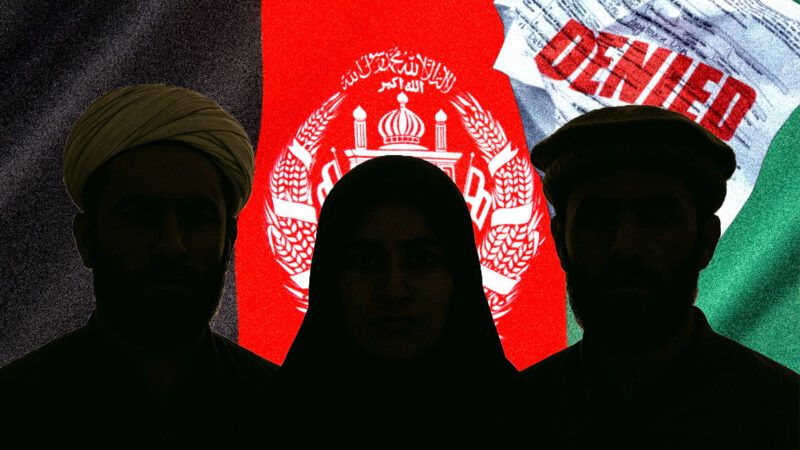Afghan Allies Under Pressure to Self-Deport: Voices from Camp As Sayliyah
"We have no criticism of the U.S. government—on the contrary, we are truly thankful. However, we are deeply afraid of the possibility of being returned to Afghanistan."

As programs created to support America's Afghan allies are increasingly shuttered, about 1,500 Afghans remain on U.S. base Camp As Sayliyah (CAS) in Doha, Qatar, uncertain about their futures.
Around 1,200 CAS residents are waiting for processing through the U.S. Refugee Admissions Program (USRAP), which has been suspended by executive order since January 20. The International Refugee Assistance Project (IRAP) has attempted to enforce the resumption of the program through Pacito v. Trump. The government has fought the case strenuously, including with its most recent argument that refugees are included in their travel ban.
On July 14, however, Judge Jamal Whitehead ordered the government to resume processing USRAP cases for Afghans at CAS within 14 days.
Senior Staff Attorney at IRAP Mevlüde Akay Alp, said "the court rejected the government's attempts to undermine its order to process refugees, including Afghans." Acknowledging the likely legal battles ahead, Alp added that "the government is obligated to process Afghans at CAS, and IRAP stands ready to fight back against any further attempts to abdicate its responsibility to protect Afghan refugees."
These ever-changing circumstances weigh heavily on Afghans in the USRAP program. Multiple CAS residents and American volunteers confirm that last week, USRAP applicants held several days of peaceful demonstrations to protest the lack of information about their futures. Individuals who spoke on condition of anonymity said that U.S. government officials responded to the protest by telling residents that CAS will close on September 28 and that refugee resettlement is not an option due to the travel ban.
Two CAS residents said that Afghans on base have been encouraged to return to their country. Families who choose to self-deport are reportedly being praised for making a "smart" decision.
One resident said that officials promised to extend Afghans' visas if they were instructed to do so, but noted that when extensions are no longer possible, residents "will definitely be returned to Afghanistan."
Shawn VanDiver, president of #AfghanEvac, a nonprofit organization supporting Afghans seeking relocation and resettlement, said that U.S. leaders are treating Afghans at CAS "like a public relations problem. This isn't just a policy failure. It's a moral failure," VanDiver said. "And those responsible know exactly what they're doing."
Multiple CAS residents and family members told me about the hopelessness USRAP applicants feel on base, using aliases given the danger they face if they are returned to Afghanistan.
Frozan qualified for the USRAP through her work as an attorney involved in divorce, separation, alimony, custody, and criminal cases. She says the Taliban have threatened her by phone and in writing because she "succeeded in saving [a Taliban member's] wife from the hands of [a] tyrant" by granting her a divorce.
Frozan is happy about conditions in Qatar, but said it would be "very dangerous" for her to return to her homeland. She explained that a female colleague was kidnapped, gang-raped, and murdered at the beginning of the Taliban regime.
"Nothing is possible in Afghanistan," Frozan said, explaining there is "no government, no voice, no freedom."
Khalid was a combat interpreter for the U.S. Marines in 2009 when he was severely wounded in an improvised explosive device explosion in southern Afghanistan. After his recovery, he spent five more years interpreting for U.S. forces in Kabul before receiving his Special Immigrant Visa, moving to the United States, and enlisting in the Army.
Now a U.S. citizen, Khalid spent the years following his service as a Defense Department contractor, working inside Afghanistan until America's August 2021 withdrawal, when he was evacuated through Hamid Karzai International Airport. Khalid's family, endangered due to the notoriety some members held in the prior Afghan government, was unable to reach the airfield. For three years, they were "moving from one location to the other" while the Taliban hunted them.
Help came when Khalid's family was evacuated to Qatar in 2024 through the USRAP program. Khalid said his family was "through all the process, all the vetting, screening" and were "waiting on final clearance for flight" when the USRAP was suspended.
The idea that the families of U.S. veterans could be returned to Afghanistan is "actually heartbreaking," Khalid said. "The prospect of them being sent back is just a nightmare I cannot deal with."
Najib qualifies for the USRAP through a family member who was a vital asset for the development of the Afghan military. Prior to arriving in Qatar, Najib said the Taliban came to the family's home multiple times asking for his family member's location. "We [were] just scared," he explained. Though Najib has been at CAS for nearly a year, the U.S. government has yet to evacuate his most endangered family member to safety.
Najib reports that his processing was complete and his travel to the U.S. was nearly scheduled when the government said that they would not move him without his left-behind family member.
"We are under serious mental and emotional pressure here. We have no criticism of the U.S. government—on the contrary, we are truly thankful. However, we are deeply afraid of the possibility of being returned to Afghanistan. If the camp is closed, we fear to be handed over to the Qatari police and deported."
If he is returned to his country, Najib said that his "life also goes back like 20 years."


Show Comments (13)